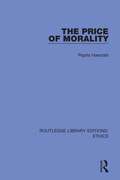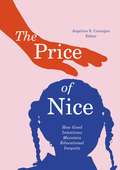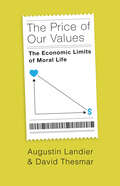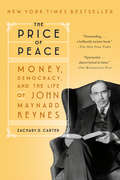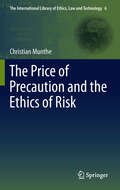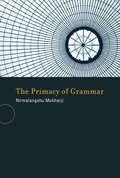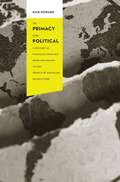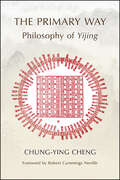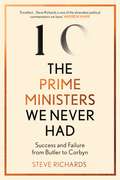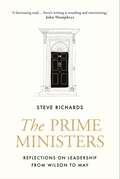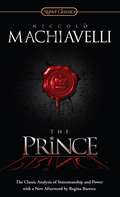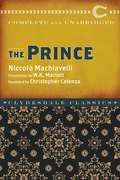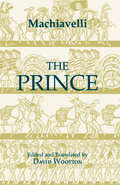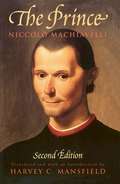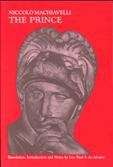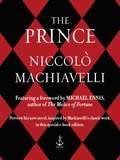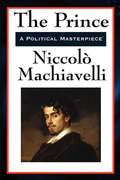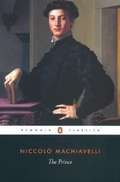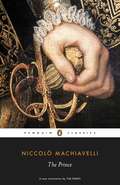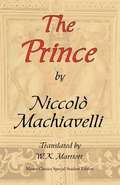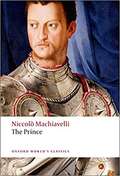- Table View
- List View
The Price of Morality
by Pepita HaezrahiOriginally published in 1961, this book defines the specific traits and describes the concrete qualities of moral action. It denotes the boundaries and discusses the conflicts which arise between the aims of moral goodness and those of pure religiosity, personal and historic grandeur and creative excellence. The theories of theologians like Barth and Brunner among others, and the maximalist theories of Nietzsche and his disciples and certain existentialists are contrasted with Kant’s essay on pure ethics.
The Price of Nice: How Good Intentions Maintain Educational Inequity
by Angelina E. CastagnoHow being &“nice&” in school and university settings works to reinforce racialized, gendered, and (dis)ability-related inequities in education and society Being nice is difficult to critique. Niceness is almost always portrayed and felt as a positive quality. In schools, nice teachers are popular among students, parents, and administrators. And yet Niceness, as a distinct set of practices and discourses, is not actually good for individuals, institutions, or communities because of the way it maintains and reinforces educational inequity. In The Price of Nice, an interdisciplinary group of scholars explores Niceness in educational spaces from elementary schools through higher education to highlight how this seemingly benign quality reinforces structural inequalities. Grounded in data, personal narrative, and theory, the chapters show that Niceness, as a raced, gendered, and classed set of behaviors, functions both as a shield to save educators from having to do the hard work of dismantling inequity and as a disciplining agent for those who attempt or even consider disrupting structures and ideologies of dominance. Contributors: Sarah Abuwandi, Arizona State U; Colin Ben, U of Utah; Nicholas Bustamante, Arizona State U; Aidan/Amanda J. Charles, Northern Arizona U; Jeremiah Chin, Arizona State U; Sally Campbell Galman, U of Massachusetts; Frederick Gooding Jr., Texas Christian U; Deirdre Judge, Tufts U; Katie A. Lazdowski; Román Liera, U of Southern California; Sylvia Mac, U of La Verne; Lindsey Malcolm-Piqueux, California Institute of Technology; Giselle Martinez Negrette, U of Wisconsin–Madison; Amber Poleviyuma, Arizona State U; Alexus Richmond, Arizona State U; Frances J. Riemer, Northern Arizona U; Jessica Sierk, St. Lawrence U; Bailey B. Smolarek, U of Wisconsin–Madison; Jessica Solyom, Arizona State U; Megan Tom, Arizona State U; Sabina Vaught, U of Oklahoma; Cynthia Diana Villarreal, U of Southern California; Kristine T. Weatherston, Temple U; Joseph C. Wegwert, Northern Arizona U; Marguerite Anne Fillion Wilson, Binghamton U; Jia-Hui Stefanie Wong, Trinity College; Denise Gray Yull, Binghamton U.
The Price of Our Values: The Economic Limits of Moral Life
by Augustin Landier David ThesmarThe economic case for self-interest at the outer limits of being morally good. Modern life is an exercise in discomfort. In the face of endless injustice, how much selfishness is permissible? How do we square suffering elsewhere with our hope to thrive at home? How does one strive for the greater good while guarding one's personal interests? The Price of Our Values argues that the answers to these questions are economic: by weighing our sense of the personal costs associated with the outer limits of our moral beliefs. These tradeoffs—the want to be good, the personal costs of being good, and the points at which people abandon goodness due to its costs—are somewhat unsettling. But as economists Augustin Landier and David Thesmar show, they are highly predictable, even justified. Our values guide us, but we are also forced to consider economic costs to settle decisions. The Price of Our Values is an economic reckoning with the universal unease of contemporary moral life. Wielding insights from the philosophical founders of the field, Landier and Thesmar provide frameworks for thinking about the place of values—justice, freedom, beauty— in the decisions of modern life. They do so in terms that seek to be consistent with both our good intentions and their limits.
The Price of Peace: Money, Democracy, and the Life of John Maynard Keynes
by Zachary D. Carter&“An important, resonant, and memorable portrait&” (Jon Meacham) of world-changing economist John Maynard Keynes and the transformative ideas that outlived him &“A brilliantly wrought, beautifully written life of one of the most captivating intellects of the twentieth century.&”—Liaquat Ahamed, author of Lords of Finance At the dawn of World War I, a young academic named John Maynard Keynes hastily folded his long legs into the sidecar of his brother-in-law&’s motorcycle for an odd, frantic journey that would change the course of history. Swept away from his placid home at Cambridge University by the currents of the conflict, Keynes found himself thrust into the halls of European treasuries to arrange emergency loans and packed off to America to negotiate the terms of economic combat. The terror and anxiety unleashed by the war would transform him from a comfortable obscurity into the most influential and controversial intellectual of his day—a man whose ideas still retain the power to shock in our own time.Keynes was not only an economist but the preeminent anti-authoritarian thinker of the twentieth century, one who devoted his life to the belief that art and ideas could conquer war and deprivation. As a moral philosopher, political theorist, and statesman, Keynes led an extraordinary life that took him from intimate turn-of-the-century parties in London&’s riotous Bloomsbury art scene to the fevered negotiations in Paris that shaped the Treaty of Versailles, from stock market crashes on two continents to diplomatic breakthroughs in the mountains of New Hampshire to wartime ballet openings at London&’s extravagant Covent Garden. Along the way, Keynes reinvented Enlightenment liberalism to meet the harrowing crises of the twentieth century. In the United States, his ideas became the foundation of a burgeoning economics profession, but they also became a flash point in the broader political struggle of the Cold War, as Keynesian acolytes faced off against conservatives in an intellectual battle for the future of the country—and the world. Though many Keynesian ideas survived the struggle, much of the project to which he devoted his life was lost. In this riveting biography, veteran journalist Zachary D. Carter unearths the lost legacy of one of history&’s most fascinating minds. The Price of Peace revives a forgotten set of ideas about democracy, money, and the good life with transformative implications for today&’s debates over inequality and the power politics that shape the global order.
The Price of Precaution and the Ethics of Risk
by Christian MuntheChristian Munthe undertakes an innovative, in-depth philosophical analysis of what the idea of a precautionary principle is and should be about. A novel theory of the ethics of imposing risks is developed and used as a foundation for defending the idea of precaution in environmental and technological policy making against its critics, while at the same time avoiding a number of identified flaws. The theory is shown to have far-reaching practical conclusions for areas such as bio-, information- and nuclear technology, and global environmental policy in areas such as climate change. The author argues that, while the price we pay for precaution must not be too high, we have to be prepared to pay it in order to act ethically defensible. A number of practical suggestions for precautionary regulation and policy making are made on the basis of this, and some challenges to basic ethical theory as well as consumerist societies, the global political order and liberal democracy are identified. Munthe's book is a well-argued contribution to the PP debate, putting neglected justificatory and methodological questions at the forefront. His many discussions of alternative accounts as well as his drawing out the consequences of his own suggestion in practical cases give the reader a thorough, holistic sense of what justification of PP amounts to. /..../ Munthe's main case, his argumentation for the requirement of precaution as a moral norm, is convincing and puts a strong pressure on too narrow alternative suggestions on how it should be perceived and justified, and he launches a plausible defence of its practical usability.
The Primacy of Grammar
by Nirmalangshu MukherjiA proposal that the biolinguistic approach to human languages may have identified, beyond the study of language, a specific structure of the human mind.The contemporary discipline of biolinguistics is beginning to have the feel of scientific inquiry. Biolinguistics—especially the work of Noam Chomsky—suggests that the design of language may be “perfect”: language is an optimal solution to conditions of sound and meaning. What is the scope of this inquiry? Which aspect of nature does this science investigate? What is its relation to the rest of science? What notions of language and mind are under investigation? This book is a study of such foundational questions. Exploring Chomsky's claims, Nirmalangshu Mukherji argues that the significance of biolinguistic inquiry extends beyond the domain of language.Biolinguistics is primarily concerned with grammars that represent just the computational aspects of the mind/brain. This restriction to grammars, Mukherji argues, opens the possibility that the computational system of human language may be involved in each cognitive system that requires similar computational resources. Deploying analytical argumentation and empirical evidence, Mukherji suggests that a computational system of language consisting of very specific principles and operations is likely to be involved in each articulatory symbol system—such as music—that manifests unboundedness. In that sense, the biolinguistics approach may have identified, after thousands of years of inquiry, a specific structure of the human mind.
The Primacy of the Political: A History of Political Thought from the Greeks to the French and American Revolutions (Columbia Studies in Political Thought / Political History)
by Dick HowardThe conflict between politics and antipolitics has replayed throughout Western history and philosophical thought. From the beginning, Plato's quest for absolute certainty led him to denounce democracy, an anti-political position challenged by Aristotle. In his wide-ranging narrative, Dick Howard puts this dilemma into fresh perspective, proving our contemporary political problems are not as unique as we think.Howard begins with democracy in ancient Greece and the rise and fall of republican politics in Rome. In the wake of Rome's collapse, political thought searched for a new medium, and the conflict between politics and antipolitics reemerged through the contrasting theories of Saint Augustine and Saint Thomas. During the Renaissance and Reformation, the emergence of the modern individual again transformed the terrain of the political. Even so, politics vs. antipolitics dominated the period, frustrating even Machiavelli, who sought to reconceptualize the nature of political thought. Hobbes and Locke, theorists of the social contract, then reenacted the conflict, which Rousseau sought (in vain) to overcome. Adam Smith and the growth of modern economic liberalism, the radicalism of the French revolution, and the conservative reaction of Edmund Burke subsequently marked the triumph of antipolitics, while the American Revolution momentarily offered the potential for a renewal of politics. Taken together, these historical examples, viewed through the prism of philosophy, reveal the roots of today's political climate and the trajectory of battles yet to come.
The Primary Way: Philosophy of Yijing
by Chung-ying ChengIn The Primary Way, the distinguished scholar of Chinese philosophy Chung-ying Cheng synthesizes his lifetime of work on the Yijing, also known as the I Ching or Book of Changes. Cheng offers a systematic engagement with the classic Chinese text as a philosophy that is still valuable and relevant today. In contemporary philosophical terms, Cheng has developed the ontological hermeneutics of the Yijing as well as its philosophical methodology of symbolic reference in a holistic and onto-generative system of trigrams and hexagrams. The book is organized around eight themes that illuminate Cheng's interpretation of the Yijing as a philosophy for creative human action and transformation. He demonstrates how the philosophy of change in the Yijing embodies early Chinese ontology, cosmology, epistemology, and virtue ethics in the interpretation of divinatory judgments. Cheng's work shows how the philosophy of change contains a vision of humanity as creatively related to heaven and earth, and how it gives positive meaning to any change as part of a ceaseless creativity. With this understanding, it enables humanity to develop its potential as a partner of heaven and earth.
The Prime Ministers We Never Had: Success and Failure from Butler to Corbyn
by Steve RichardsBOOK OF THE YEAR, The Times, Guardian and ProspectWas Harold Wilson a bigger figure than Denis Healey? Was John Major more 'prime ministerial' than Michael Heseltine? Would David Miliband have become prime minister if it were not for his brother Ed? Would Ed have become prime minister if it were not for David? How close did Jeremy Corbyn come to being prime minister?In this piercing and original study, journalist and commentator Steve Richards looks at eleven prime ministers we never had, examining what made each of these illustrious figures unique and why they failed to make the final leap to the very top. Combining astute insights into the demands of leadership with compelling historical analysis, this fascinating exploration of failure and success sheds new light on some of the most compelling characters in British public life.
The Prime Ministers: Reflections on Leadership from Wilson to May
by Steve RichardsAt a time of unprecedented political upheaval, this magisterial history explains who leads us and why. From Harold Wilson to Theresa May, it brilliantly brings to life all nine inhabitants of 10 Downing Street over the past 50 years, vividly outlining their successes and failures—and what made each of them special. Based on unprecedented access and in-depth interviews, and inspired by the author's BBC Radio 4 and television series, Steve Richards expertly examines the men and women who have defined the UK's role in the modern world and sheds new light on the demands of the highest public office in the land.
The Primitivist Theory of Truth
by Jamin AsayJamin Asay's book offers a fresh and daring perspective on the age-old question 'What is truth?', with a comprehensive articulation and defence of primitivism, the view that truth is a fundamental and indefinable concept. Often associated with Frege and the early Russell and Moore, primitivism has been largely absent from the larger conversation surrounding the nature of truth. Asay defends primitivism by drawing on a range of arguments from metaphysics, philosophy of language and philosophy of logic, and navigates between correspondence theory and deflationism by reviving analytic philosophy's first theory of truth. In its exploration of the role that truth plays in our cognitive and linguistic lives, The Primitivist Theory of Truth offers an account of not just the nature of truth, but the foundational role that truth plays in our conceptual scheme. It will be valuable for students and scholars of philosophy of language and of metaphysics.
The Prince
by Regina Barreca Niccolò Machiavelli Christian GaussThe Classic Analysis of Statesmanship and Power: After a lifetime of winning and losing at the game of politics, Florentine nobleman Machiavelli set down its ageless rules and moves in this highly readable treatise. Witty, informative, and devilishly shrewd, it has long been required reading for everyone interested in politics and power.
The Prince
by Niccolò Machiavelli Christopher CelenzaPackaged in handsome, affordable trade editions, Clydesdale Classics is a new series of essential works. From the musings of intellectuals such as Thomas Paine in Common Sense to the striking personal narrative of Harriet Jacobs in Incidents in the Life of a Slave Girl, this new series is a comprehensive collection of our intellectual history through the words of the exceptional few.Widely acknowledged as Machiavelli’s defining work, The Prince is an innovative and rich treatise marked by his political theories and the principles of leadership. Based upon his own experiences witnessing “the actions of great men” and the often immoral aspects that come with power, Machiavelli encouraged ambition amongst leaders—which was a break from the philosophy of other contemporary thinkers. The Prince identifies the aims of powerful leaders, which can help to justify the use of largely immoral means in their methods.With a new foreword by scholar Christopher Celenza, this essential work on politics contemplates leadership in a manner still relevant today. This lesson in autocratic rule will provide the reader with the author’s rational approach to control and the contextualization for the term “Machiavellian.”
The Prince
by Niccolo Machiavelli David WoottonThis is an excellent, readable and vigorous translation of The Prince, but it is much more than simply a translation. The map, notes and guide to further reading are crisp, to-the-point and yet nicely comprehensive. The inclusion of the letter to Vettori is most welcome. But, above all, the Introduction is so gripping and lively that it has convinced me to include The Prince in my syllabus for History of Western Civilization the next time that I teach it. . . . Great price, too! And lovely printing and layout. --Rachel Fulton, University of Chicago
The Prince
by Niccolo Machiavelli Harvey C. MansfieldPolitics according to Machiavelli is not limited by things above it, and things normally taken to be outside politics-- the "givens" in any political situation-- turn out to be much more under the control of politics than politicians, peoples, and philosophers have assumed.
The Prince
by Niccolo Machiavelli Leo Paul S. de AlvarezA worthy translation of an important document in political philosophy! What separates this translation from others available is de Alvarez's attempt to be literal in order to preserve the remarkable precision of Machiavelli's speech. This distinctively accurate translation has been described as "careful, unusual, and challenging," permitting the reader to appreciate the manner and substance of Machiavelli's argument. States the translator in his twenty-four page introduction: "Among the reasons why this translation attempts to preserve the difficulties and ambiguities of the text is that Machiavelli is providing a puzzle that must be carefully and patiently worked through, and only those so willing to work will see what it is he has 'with great diligence long reflected upon and examined.' In other words, Machiavelli intends that the reader be caught up in the web of his discourse, and he does this by fascinating his readers with difficulties."
The Prince
by Niccolo Machiavelli Michael EnnisThis is an EXACT reproduction of a book published before 1923. This IS NOT an OCR'd book with strange characters, introduced typographical errors, and jumbled words. This book may have occasional imperfections such as missing or blurred pages, poor pictures, errant marks, etc. that were either part of the original artifact, or were introduced by the scanning process. We believe this work is culturally important, and despite the imperfections, have elected to bring it back into print as part of our continuing commitment to the preservation of printed works worldwide. We appreciate your understanding of the imperfections in the preservation process, and hope you enjoy this valuable book.
The Prince
by Tim Parks Niccolo MachiavelliA new translation of the infamous Renaissance classic, in a striking deluxe edition The original blueprint for realpolitik, The Prince shocked sixteenth-century Europe with its advocacy of ruthless tactics for gaining absolute power and its abandonment of conventional morality. For this treatise on statecraft, Machiavelli drew upon his own experience of office under the turbulent Florentine republic, rejecting traditional values of political theory and recognizing the complicated, transient nature of political life. Concerned not with lofty ideals, but with a regime that would last, this seminal work of modern political thought retains its power to alarm and to instruct.
The Prince
by Niccolo MachiavelliIt was Niccolò Machiavelli who essentially removed ethics from government. He did it with this book, when he asserted that The Prince (president, dictator, prime minister, etc.) does not have to be concerned with ethics, as long as their motivation is to protect the state. It is this questionable belief that in many ways had lead to the modern world as we know it. His assertion was that the head of state must protect the state no matter the cost and no matter what rules he or she breaks in the process. If you want to understand modern politics you must read this book.
The Prince
by Niccolo MachiavelliNiccoló Machiavelli drew on his own experience of office under the turbulent Florentine republic, rejecting traditional values of political theory and recognizing the complicated, transient nature of political life. Concerned not with lofty ideal but with a regime that would last, The Prince has become the bible of realpolitik, and it still retains its power to alarm and to instruct.
The Prince
by Niccolo Machiavelli'A gripping work, and a gripping translation' Nicholas Lezard, GuardianNiccolò Machiavelli's brutally uncompromising manual of statecraft, The Prince is translated and edited with an introduction by Tim Parks in Penguin Classics As a diplomat in turbulent fifteenth-century Florence, Niccolò Machiavelli knew how quickly political fortunes could rise and fall. The Prince, his tough-minded, pragmatic handbook on how power really works, made his name notorious and has remained controversial ever since. How can a leader be strong and decisive, yet still inspire loyalty in his followers? When is it necessary to break the rules? Is it better to be feared than loved? Examining regimes and their rulers the world over and throughout history, from Roman Emperors to renaissance Popes, from Hannibal to Cesare di Borgia, Machievalli answers all these questions in a work of realpolitik that still has shrewd political lessons for today. Tim Parks's acclaimed contemporary translation renders Machiavelli's no-nonsense original as alarming and enlightening as when it was first written. His introduction discusses Machiavelli's life and reputation, and explores the historical background to the work.'Tim Parks's swift and supple new translation brings out all its chilling modernity' Boyd Tonkin, Independent
The Prince
by Niccolò MachiavelliThe most famous book on politics ever written, The Prince remains as lively and shocking today as when it was written almost five hundred years ago. Initially denounced as a collection of sinister maxims and a recommendation of tyranny, it has more recently been defended as the first scientific treatment of politics as it is practiced rather than as it ought to be practiced. Harvey C. Mansfield's brilliant translation of this classic work, along with the new materials added for this edition, make it the definitive version of The Prince, indispensable to scholars, students, and those interested in the dark art of politics. This revised edition of Mansfield's acclaimed translation features an updated bibliography, a substantial glossary, an analytic introduction, a chronology of Machiavelli's life, and a map of Italy in Machiavelli's time. "Of the other available [translations], that of Harvey C. Mansfield makes the necessary compromises between exactness and readability, as well as providing an excellent introduction and notes."—Clifford Orwin, The Wall Street Journal "Mansfield's work . . . is worth acquiring as the best combination of accuracy and readability."—Choice "There is good reason to assert that Machiavelli has met his match in Mansfield. . . . [He] is ready to read Machiavelli as he demands to be read—plainly and boldly, but also cautiously."—John Gueguen, The Sixteenth Century Journal
The Prince
by Niccoló Machiavelli W. X. MarriottThe Prince is unique, not because it explains how to take control of other lands and how to control them, but because it gives advice that often disregards all moral and ethical rules. About this Machiavelli states that: The Prince examines the acquisition, perpetuation, and use of political power in the western world. It is a classic study of power--its acquisition, expansion, and effective use.
The Prince (Oxford World's Classics)
by Maurizio Viroli Peter Bondanella Niccolò MachiavelliWhen Machiavelli's brief treatise on Renaissance statecraft and princely power was posthumously published in 1532, it generated a debate that has raged unabated until the present day. Based upon Machiavelli's first-hand experience as an emissary of the Florentine Republic to the courts of Europe, The Prince analyses the usually violent means by which men seize, retain, and lose political power. <p><p> Machiavelli added a dimension of incisive realism to one of the major philosophical and political issues of his time, especially the relationship between public deeds and private morality. His book provides a remarkably uncompromising picture of the true nature of power, no matter in what era or by whom it is exercised. This fluent new translation is accompanied by an introduction that considers the true purpose of The Prince and dispels some of the myths associated with it. <p><p> It has the most comprehensive explanatory and critical notes found in any currently available English translation and the most comprehensive bibliography in any edition of the work. It also contains a helpful Glossary of Proper Names, an Index and a map. <p><p> About the Series: For over 100 years Oxford World's Classics has made available the broadest spectrum of literature from around the globe. Each affordable volume reflects Oxford's commitment to scholarship, providing the most accurate text plus a wealth of other valuable features, including expert introductions by leading authorities, voluminous notes to clarify the text, up-to-date bibliographies for further study, and much more.
The Prince (Penguin Classics)
by Tim Parks Niccolo MachiavelliHere is the world's most famous master plan for seizing and holding power. Astonishing in its candor The Prince even today remains a disturbingly realistic and prophetic work on what it takes to be a prince . . . a king . . . a president. When, in 1512, Machiavelli was removed from his post in his beloved Florence, he resolved to set down a treatise on leadership that was practical, not idealistic. In The Prince he envisioned would be unencumbered by ordinary ethical and moral values; his prince would be man and beast, fox and lion. Today, this small sixteenth-century masterpiece has become essential reading for every student of government, and is the ultimate book on power politics.
